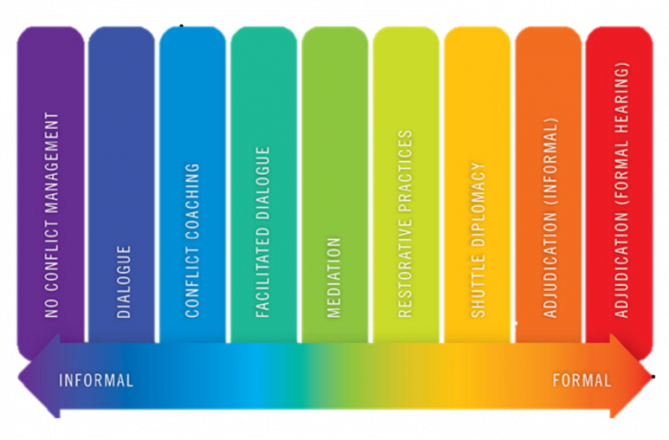Conflict Resolution
Informal Resolution & Conflict Resolution Options

The options available for Informal Resolution at Lewis & Clark are primarily pulled from the Spectrum Model (Shrage & Thompson, 2009) from the University of Michigan. In this model and its framework of inclusive excellence, there are multiple pathways of resolution that range from informal and minimal involvement on the part of the College to more formal and highly involved pathways. This approach centers around the idea that students, their needs, and their conflicts must be addressed in ways that meet their individual and situational needs. The availability of these options may vary depending on the staff trained and available to facilitate them. At this time, we do not have the capacity to offer these options for concerns around sexual misconduct or hate/bias-related misconduct, but we do hope to expand this capacity in the future.
Please consult with the Office of Student Rights & Responsibilities about which of these approaches may be best for your individual situation. These options may also be available to any student in conflict, even if a policy violation is not present.
- Facilitated Dialogue: The Office of Student Rights & Responsibilities or other designated College staff can facilitate conversations between 2+ individuals to help them overcome communication barriers and engage in conversations around mutual interests and concerns. This differs from a mediation, because this conversation will seek understanding rather than to produce agreements.
- Mediation: The Office of Student Rights & Responsibilities, or other designated College staff, can facilitate a conciliatory intervention between individuals or groups to develop shared & mutually acceptable solutions to their conflict. In cases where a mediation is needed between roommates, Student Rights & Responsibilities may refer a mediation out to the appropriate Campus Living Area Director or Resident Advisor of those students.
- Restorative Justice Conferences/Circles: Based on Indigenous practices of peacemaking, Restorative Justice practices focus on inclusive decision-making, active accountability, repairing harm, and rebuilding trust. We incorporate this concept in many of our informal resolution options, but one specific practice includes restorative justice conferences or circles. These gatherings provide an opportunity for community members to come together to address harmful behavior in a process that explores harms and needs, obligations, and necessary engagement. Involved community members include responsible parties, impacted parties, supporting parties and facilitators. Circles bring all parties together to meet, talk about what happened, and settle on a plan to repair the harm.
- Shuttle Diplomacy: For deeply divided parties where a Complainant may not want to directly face the Respondent(s), Student Rights & Responsibilities can help manage conflict and create solutions without parties needing to address each other directly. Student Rights & Responsibilities staff will meet individually with those involved and will go back and forth between parties to find mutually acceptable solutions.
- Agreed Resolutions: In cases of minor policy violations where a harmed party may be ambiguous or does not want to be highly involved, the Office of Student Rights & Responsibilities may initiate an informal form of adjudication called an Agreed Resolution. In these informal meetings, Respondent(s) meet with a staff member (called a Resolution Coordinator) to discuss an incident, any policy violations the Respondent(s) may be responsible for, and any harm that may have occurred to the community. If the Respondent(s) and the Resolution Coordinator can come to an agreement about the responsibility the Respondent holds for the policies violated and harm caused, then the Respondent will have the opportunity to work with the Resolution Coordinator to choose how they will actively repair that harm and learn from the experience. Outcomes for these conversations are meant to be educational and restorative in nature. If an agreement cannot be made, or a student does not take active accountability for their actions, the student will be referred to the appropriate formal conduct authorities and processes.
For residential students, those with repeated minor violations may have their Agreed Resolutions facilitated by a peer-led board called the Community Accountability Council (CAC). These conversations will remain the same as a normal Agreed Resolution, with the CAC taking the place of a Resolution Coordinator. However, by meeting with other students, Respondents can discuss with their peers how their actions impact the students living around them in the residence halls and agree on what actions must be taken to repair harm done to the community.
To see a flowchart for routing of Agreed Resolution options versus formal conduct resolution options, please click HERE.
Student Rights and Responsibilities is located in room 110 of Templeton on the Fir Acres Campus.
MSC: 113
email srr@lclark.edu
voice 503-768-8181
Interim Director
Jessica Caron, M. Ed.
Student Rights and Responsibilities
Lewis & Clark
615 S. Palatine Hill Road MSC 113
Portland OR 97219